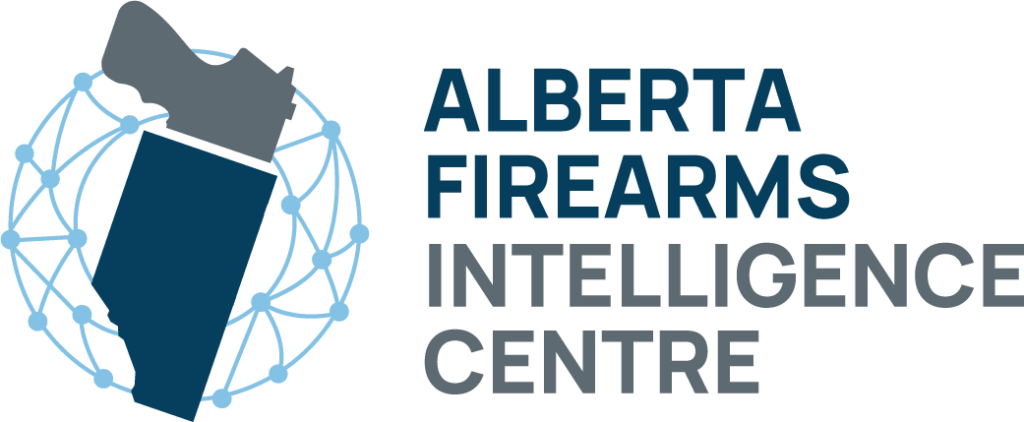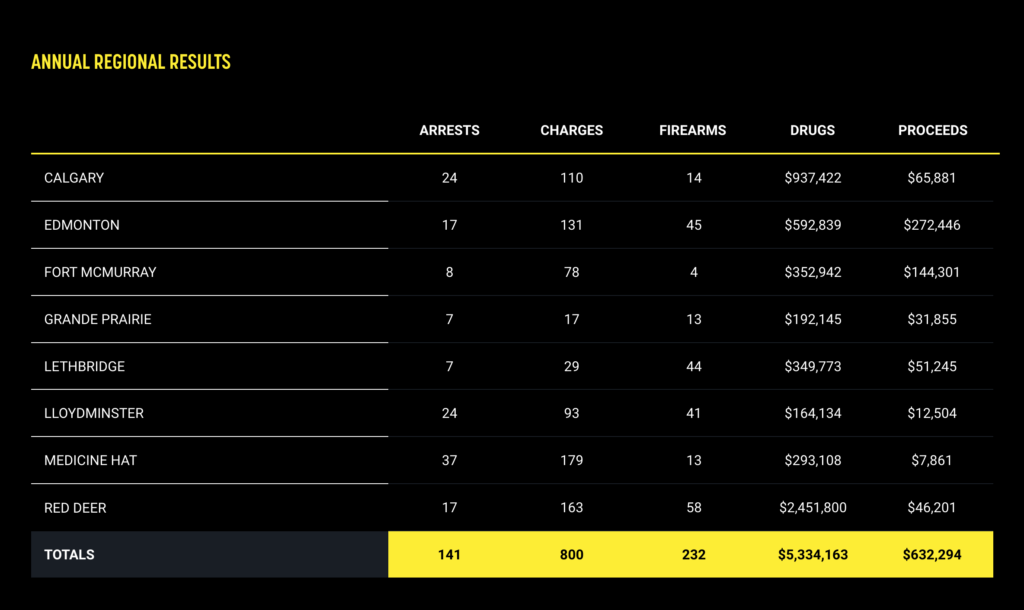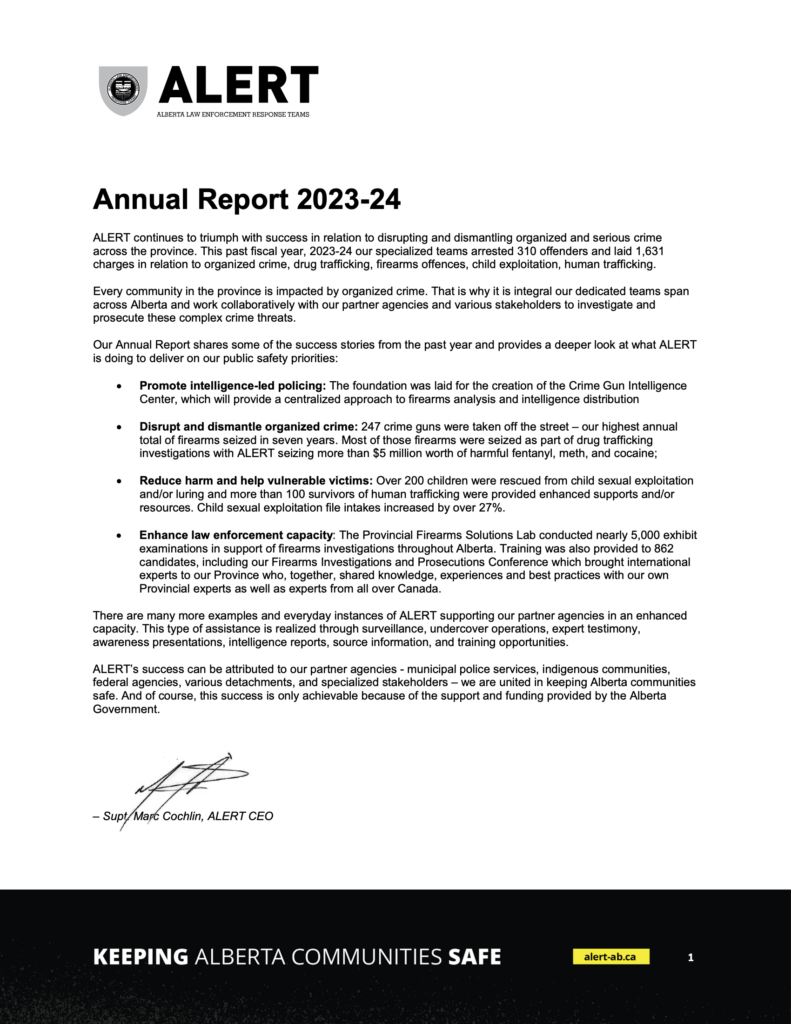Barry Balerud knows the important role intelligence can play in fighting crime. Now he and his team are working hard to make other law enforcement officials see it the same way.
Balerud has been the director of Criminal Intelligence Service Alberta (CISA) for about two and a half years now. But his relationship with the agency goes back much further to his days with the Calgary Police Service, most recently as an Inspector with the Criminal Operations Section. On that side of police work, Balerud had good experiences with CISA as he worked files from the street level to the organized crime level.

Now that he’s on the other side, working with CISA, Balerud wants to help other law enforcement officials see the value in what his team is doing.
“Historically, operational teams have been critical of intelligence; they’ll challenge intelligence. It’s not easy being responsible for intelligence, but I take it seriously. It’s a big responsibility,” he says. “We want to make sure we’re getting the best intelligence and information out there for the operational teams.”
CISA has roughly a dozen employees, including strategic intelligence analysts, information facilitators, security intelligence officers seconded from Correctional Services Canada, and two people who deal with the Automated Criminal Intelligence Information System (ACIIS). Together, they monitor and assess organized crime in Alberta, relying on reports submitted by partner agencies ranging from city police departments and RCMP detachments to Alberta Fish and Wildlife, the Alberta Gaming and Liquor Commission and the Canadian Border Services Agency.
“Their job is really to analyze and establish the identities of those criminal networks, to identify who the police should be looking at,” Balerud says.
“In a perfect world, we’re getting information in real time that’s relevant, but that’s a challenge,” he adds. “Raw information flows through CISA daily, but we typically get a lot of our intelligence products from our police partners all at once, in a collection plan, near the end of the year.”
Information from those reports – including the scope of an individual or group’s operations and the markets they’re involved in – can be disseminated throughout the year via intelligence reports, but much of CISA’s efforts go into producing a Provincial Threat Assessment each April. The PTA outlines low-, medium- and high-threat organized crime groups operating in the province, and identifies individual Persons of Intelligence Interest who may be influencing crime trends in the province.
 “The PTA is for their awareness, and hopefully police will use it to devise strategies against the more serious targets,” Balerud says. “Historically, the PTA was produced for very senior management, the Chief level, to use strategically, to determine if they want to allocate resources to target groups. But I think it’s transitioning more to an operational tool. When they’re looking for targets, it’s another tool that’s available to them.”
“The PTA is for their awareness, and hopefully police will use it to devise strategies against the more serious targets,” Balerud says. “Historically, the PTA was produced for very senior management, the Chief level, to use strategically, to determine if they want to allocate resources to target groups. But I think it’s transitioning more to an operational tool. When they’re looking for targets, it’s another tool that’s available to them.”
Reports mostly come from partner agencies within Alberta, but CISA’s scope is much broader. Each province in Canada has its own criminal intelligence service and produces its own PTA, which CISA receives and cross-references. The federal government also operates Criminal Intelligence Service Canada, which produces a National Threat Assessment.
Aside from producing intelligence reports and the PTA, though, Balerud also sees his role as one of advocating for CISA and educating partners on the value of its intelligence products. He hopes that will increase the flow of information to CISA and make those products even more comprehensive in the future.
“CISA needs to be embedded within our partner agencies’ intelligence models,” he says. “With the larger police agencies in Alberta, each one already has intelligence models in place. CISA needs to be part of that whole process, so when those agencies are collecting intelligence in their jurisdiction, as part of that intelligence sharing process, that is naturally shared with CISA.”
The work we do is about our communities, and that’s why we recognize that residents can be instrumental in tackling serious crime. If you or someone you know has been the victim of a crime, or you suspect criminal activity, please reach out. Your information will remain strictly confidential.
Thank you for helping to make Alberta safer by being actively involved and reporting suspicious activity.


Since 2022, CISA has been guided by four pillars that focus the effort to promote an integrated, intelligence-led approach to combating organized crime; these are:
Criminal Intelligence Service Alberta (CISA) has recently developed an Alberta Firearms Intelligence Centre (AFIC) to equitably expand access to firearms intelligence for all law enforcement agencies within Alberta. AFIC will provide timely, accurate, and actionable intelligence to law enforcement agencies and policy-makers to achieve the shared and collaborative goals of increasing public safety concerning firearm-related crimes.
Q1
Q2
Q3
Q4
2023-24
2022-23
2021-22
FILE INTAKES
680
872
1,149
1,114
3,815
2,994
2,764
SUSPECTS CHARGED
22
16
34
37
109
81
125
CHARGES LAID
87
45
123
160
415
351
413
CHILDREN RESCUED
26
78
56
43
203
46
100
EXHIBITS SEIZED
335
368
545
476
1,724
1,243
1,845
TOTAL PHOTOS/VIDEOS
262,400
511,133
1,374,310
606,254
2,754,097
2,551,921
13,260,819
Q1
Q2
Q3
Q4
2023-24
2022-23
2021-22
SUSPECTS CHARGED
13
10
7
4
34
30
76
CHARGES LAID
79
46
87
19
231
96
157
VICTIM INTERVENTIONS
30
29
17
37
113
28
22
Q1
Q2
Q3
Q4
2023-24
2022-23
2021-22
INTELLIGENCE REPORTS
409
296
327
442
1,474
1,560
1,318
TRAINING COURSES
5
3
8
11
27
36
25
CANDIDATES TRAINED
321
56
135
350
862
933
638
Q1
Q2
Q3
Q4
2023-24
2022-23
2021-22
SUSPECTS CHARGED
40
27
42
32
141
197
168
CHARGES LAID
176
156
237
231
800
1,088
820
FIREARMS SEIZED
105
53
26
48
232
102
126
EST. VALUE OF DRUGS SEIZED
$906,814
$553,851
$2,725,161
$1,148,337
$5,334,163
$10,898,269
$334,093,020
PROCEEDS OF CRIME SEIZED
$218,133
$52,970
$130,996
$230,195
$632,294
$1,432,847
$21,740,617
ARRESTS
CHARGES
FIREARMS
DRUGS
PROCEEDS
CALGARY
24
110
14
$937,422
$65,881
EDMONTON
17
131
45
$592,839
$272,446
FORT MCMURRAY
8
78
4
$352,942
$144,301
GRANDE PRAIRIE
7
17
13
$192,145
$31,855
LETHBRIDGE
7
29
44
$349,773
$51,245
LLOYDMINSTER
24
93
41
$164,134
$12,504
MEDICINE HAT
37
179
13
$293,108
$7,861
RED DEER
17
163
58
$2,451,800
$46,201
TOTALS
141
800
232
$5,334,163
$632,294
Q1
Q2
Q3
Q4
2023-24
2022-23
2021-22
SUSPECTS CHARGED
1
–
1
–
2
1
10
CHARGES LAID
–
–
–
–
–
11
47
STOLEN VEHICLES
23
15
1
6
45
245
118
RECOVERED ASSETS
$1,432,000
$941,025
$108,000
$260,000
$2,741025
$8,420,500
$3,919,500
Q1
Q2
Q3
Q4
2023-24
2022-23
2021-22
FIREARMS EXAMINATIONS
349
351
243
235
1,178
–
–
EXHIBIT EXAMINATIONS
1,316
1,409
891
1,099
4,715
–
–
SERIAL NUMBER RESTORATIONS
31
34
19
24
108
–
–
IBIS SUBMISSIONS
343
421
1,334
304
2,402
–
–
GUN SEIZURES
–
–
1
14
15
–
–
SUSPECTS CHARGED
–
–
4
22
26
–
–
CHARGES LAID
–
–
41
144
185
–
–



Child Sexual Abuse Material (CSAM) involves images and/or videos that depict the sexual abuse of minors – the majority of which involve prepubescent children. Often, CSAM involves explicit and/or extreme sexual assaults against the child victim (Cybertip.ca).
Learn more about Internet Child Exploitation and ALERT’s integrated teams combatting this issue.
Ghost Guns are illegal, privately manufactured firearms or lower receivers. These weapons are often made with 3D-printers, and undermine public safety due to their lack of licensing requirements, serialization and safety controls.
Learn more about Ghost Guns on ALERT’s dedicated Privately Manufactured Firearms info page